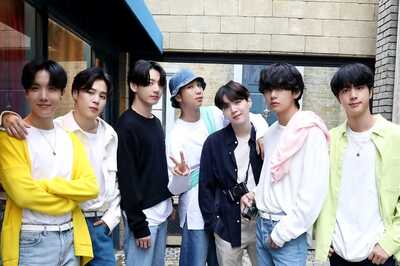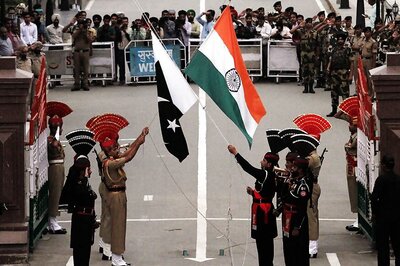
views
Ram Bahadur Rai was a news editor with Hindi daily Jansatta. He was member of the steering committee of JP Movement and participated in the student agitation of 70s. As a keen observer of Indian politics, Rai spoke to News18.com on the BJP’s landslide victory and the transformations taking place in the party under Narendra Modi and Amit Shah. Under the past dispensation, Rai was appointed as the head of the 20-member board of the Indira Gandhi National Centre for the Arts.
1) You have been an editor in a daily, also a keen observer of Indian politics, after the majority won by the BJP in 2019 Lok Sabha elections, do you sense changes and transformations taking place in the saffron party?
The party has drastically transformed under Narendra Modi and Amit Shah. I would seize this opportunity to say that after this haul of 2019, the Bhartiya Janata Party has taken the place of Indian National Congress. There was a time when Congress was seen as a party of all, and for all, but today the perception goes perfectly well with the the BJP. It is being seen as a party for all. They’ve won majority and will comfortably form the government. But that’s not they have to think about. Exactly, the way Congress did it in the past they have to build the support of society and work for larger goals. To succeed electorally and forming the government at the center and the state is one thing and to lead by taking all the sections of the society along with them in a political system is another thing.
With increased responsibilities, it is a changed BJP.
2) You have compared its phenomenal position after the recent electoral win with that of Congress. Could you elaborate on how BJP has transformed to be in the position like that of Congress of the past?
Congress is an all India party and earlier people considered Congress to be the party that worked for the benefit. The same perception is now with the BJP — ‘an all India party that works for all.’ In those days of Congress’ clout, when opposition was weak the Congress party performed the role of both the ruling as well as an opposition party.
The Congress became a president-centric party and the same way BJP became the president-centric party in 80s. When a party becomes president-centric it does not give much space to democracy. During the time of Pandit Jawaharlal Nehru and Indira Gandhi there was opposition arising from within the party, and that was a norm. In 1979, Indira Gandhi returned to power, at that time the Congress gave way to two forums — one was made a Nehru forum and the other was made a socialist forum. The former one was a democratic forum and performed the role of a pressure group, while the latter one was formed on samajwad tenets. The BJP will have to devise an internal opposition mechanism in the same way or any other way possible.
3) How do you see the leadership of Prime Minister Narendra Modi? People voted for him, no matter who was the candidate.
There was a time when the entire Congress party felt that if they want to reach the Parliament or an Assembly they have to name Nehru. Personality cult was developed in Congress which was soon followed and adopted by other parties also.
BJP has a sankalp patra, and all but that is a different topic. Party members know they can’t reach the Parliament without Modi. It happened under Nehru as well as he was considered as the vote catcher. Cut to 2019, Modi is the vote catcher.
Modi has achieved the heights that once were the boasts of Congress bigwigs. This goes back to your first question on BJP’s transformation. Because with this perception of being a vote catcher transformation of BJP has happened. They got a big leader who can connect to the masses and in return the masses trusted him.
As a result, today the entire party is looking towards one man – Modi.
BJP, despite collective leadership has become a personality-centric party. Whether this is good or bad I don’t know. If you see, other parties are also going the same way. In Andhra Pradesh, the chorus was to make Jagan win. Nobody was saying that the party should win.
5) Does that also mean this kind of personality cult reminiscent of Nehru’s did not happen under the late Atal Bihari Vajpayee?
Vajpayee was a great orator and leader. He was big but he was not known the way Modi is known. Modi is considered pro-poor. Vajpayee was a big leader with appeal in special sections but not among masses.
6) He started Gandhian Socialism...
Yes, he started Gandhian Socialism but it ended with his approval. He spoke on it in a speech that left his supporters confounded. The party members were confused about what this term means – ‘Whether it is against the BJP or something big and new?’ There no definite answers. One day, I was one the people who went to him seeking explanation on Gandhian Socialism. And to that question he replied, saying, "I just said it. You people have taken it seriously?" This slogan was of no use to them. When LK Advani became the president the narrative was built on cultural nationalism.
7) How has the cultural nationalism changed under Modi?
Ideologically, BJP is a nationalist party. Cultural nationalism is inherent in BJP. It is viewed as a sentimental issue. Modi has given Cultural Nationalism a new life with interspersing economic reality with it. He has made people see the phenomenon as a socio-economic issue which is part of nationalism.
8) There was much criticism when the old party leaders were given the role in Margsarshak Mandal. How do you see the development in shaping the BJP leadership?
This was an old the demand within the BJP itself. They wanted to encourage the new leadership and people chose Modi. The margdarshak mandal was made on the lines of the values of a parivar that are part of Indian culture. But if you look at this development politically, it is seen as sidelining, which in my opinion is not correct.
Encouraging the new leadership was important also because the young leaders started becoming visible. There were fresh faces appearing in other parties. Mulayam Singh Yadav gave way to foreign-educated Akhilesh Yadav. People knew that Dr Manmohan Singh is the caretaker and one day Rahul Gandhi is going to take over.
Today, when we see the election data we find that in the 2019 elections there is an overwhelming number of first-time voters, the young voters, which has gone to BJP. They found the leadership energetic and the one that has a future.
9) After the landslide victory by the BJP it was said that the vote was cast on communal lines. Opposition leaders said that in this election Hindu voters voted as Hindus.
What you are saying is a reflection and not reality because this vote is the mandate on Modi’s several welfare schemes. People did not vote as Hindus or Muslims but voted as citizens. He never said that the schemes are only for Hindus and not for Muslims.




















Comments
0 comment